Gıda Egemenliğine Yerel Destek: Bodrum Tohum Derneği Örneği
Gıda Egemenliği, Sosyal ve Dayanışma Ekonomisi, Yerelleşme, Bodrum, Tohum Derneği
___
- Akram-Lodgi, A.H. (2015). Accelerating Towards Food Sovereignty, Third World Quarterly, Sayı 36(3), s. 563-583, DOI: 10.1080/01436597.2015.1002989.
- Altieri, M.A. ve Toledo, V.M. (2011). The Agroecological Revolution in Latin America: Rescuing Nature, Ensuring Food Sovereignty and Empowering Peasants, The Journal of Peasant Studies, Sayı (38)3, s.587-612, DOI: 10.1080/03066150.2011.582947.
- Bacon, C.M. (2015). Food Sovereignty, Food Security and Fair Trade: The Case of an Influential Nicaroguan Smallholder Cooperative, Third World Quarterly, Sayı (36)3, s. 469-488.
- BM. (2018). United Nations Department of Economic and Social Affairs, “68% of the world population projected to live in urban areas by 2050”, https://www.un.org/development/desa/en/news/population/2018-revision-of-world-urbanization-prospects.html#:~:text=By%202030%2C%20the%20world%20is,located%20in%20Asia%20and%20Africa (20.08.2020).
- Bodrum Tohum Derneği. (2013). https://tr-tr.facebook.com/pg/bodrumtohumdernegi/about/?ref=page_internal, (15.02.2020).
- Borras, S.M. (2008). La Via Campesina and Its Global Campaign for Agrarian Reform, Journal of Agrarian Change, Sayı 8(2-3), s. 258-289.
- Chaifetz, A. ve Jagger, P. (2014). 40 Years of Dialogue on Food Sovereignty: A Review and a Look Ahead, Global Food Security, Sayı 3, s. 85-91, http://dx.doi.org/10.1016/j.gfs.2014.04.002.
- Claeys, P. (2012). The Creation of New Rights by the Food Sovereignty Movement: The Challenge of Institutionalizing Subversion, Sociology, Sayı 46(5), s. 844-860, https://doi.org/10.1177/0038038512451534.
- Claeys, P. ve Duncan, J. (2019). Do We Need to Categorize it? Reflections on Constituencies and Quotas as Tools for Negotiating Difference in the Global Food Sovereignty Convergence Space, The Journal of Peasant Studies, Sayı (46)7, s. 1477-1498, DOI: 10.1080/03066150.2018.1512489.
- Constantini, A., Pastorelli, G. ve Sebillo, A. (2019). How Social Enterprises Contribute to Alternative Food Systems, Working paper CIRIEC No2019/14.
- Diaz, I.I. ve Hunsberger, C. (2018). Can Agroecological Coffee Be Part of a Food Sovereignty Strategy in Puerto Rico?, Goeforum, Sayı 97, s. 84-94.
- DSÖ. (2019). “World Hunger is Still not Going Down after Three Years and Obesity is Still Growing”, https://www.who.int/news-room/detail/15-07-2019-world-hunger-is-still-not-going-down-after-three-years-and-obesity-is-still-growing-un-report (20.08.2020).
- Edelman, M. (1999). Peasants Against Globalization. Rural Social Movements in Costa Rica, Stanford, Stanford University Press.
- Eilola, S., Kayhko, N., Fagerholm, N. ve Kombo, Y.H. (2014). Linking Farmers’ Knowledge, Farming Strategies, and Consequent Cultivation Patterns in to the Identification of Healthy Agroecosystem Characteristics at Local Scales, Agroecology and Sustainable Food Systems, Sayı (38)9, s. 1047-1077, DOI: 10/1080/21683565.2014.92300.
- FAO. (2013). Food Security and Food Sovereignty (Hazırlayanlar: Gordillo,G. ve Mendez Jeronimo,O.). FAO, Rome http://www.fao.org/3/a-ax736e.pdf, (24.02.2020).
- Gliessman, S. (2013). Agroecology: Growing the Roots of Resistance, Agroecology and Sustainable Food Systems, Sayı (37)1, DOI: 10.1080/10440046.2012.736927.
- Grasseni, C., Forno, F. ve Signori, S. (2013). Beyond Alternative Food Networks: An Agenda for Comparative Analysis of Italy’s Solidarity Purchase Groups (GAS) and Districts of Solidarity Economy (DES) Vis-Avis US Community Economies, UNRISD Conference: Potential and Limits of Social and Solidarity Economy, 6-8 Mayıs, Cenevre, İsviçre.
- Hitchman, J. (2015). Advocacy, Social Movements, Short Distribution Chains and Policy: An Illustrated Analytical Approach, Urgenci Working Paper No 1, https://urgenci.net/wp-content/uploads/2015/01/Hitchman_CASS1.pdf, (20.02.2020).
- Hitchman, J. (2017). Who Controls the Food System?, https://www.tni.org/files/download/who_controls_the_food_system.pdf, (01.02.2020).
- Nyeleni Synthesis Report. (2007). Synthesis Report of Nyeleni 2007, Forum for Food Sovereignty, https://nyeleni.org/spip.php?article334, (15.02.2020).
- Oxfam. (2020). “World on the Brink of a ‘Hunger Pandemic’: Coronavirus Threatens to Push Millions into Starvation”, https://www.oxfam.org/en/world-brink-hunger-pandemic-coronavirus-threatens-push-millions-starvation (20.08.2020).
- Partalidou, M. ve Anthopoulou, T. (2019). Social Economy and the Foodshed in Greece: Local Pathways and Constraints Through the Lenf of SDG’s, UNTFSSE Implementing the Sustainable Development Goals: What Role for Social and Solidarity Economy, 25-26 Haziran, Cenevre, İsviçre.
- Patel, R. (2009). What Does Food Sovereignty Look Like?, The Journal of Peasant Studies, Sayı (36)3, s. 663-706, DOI: 10.1080/03066150903143079.
- Perrin, A. (2019). New Trends in the SSE Regarding Agriculture and Food: A Comparison between France and India, Working paper CIRIEC No2019/2.
- Sage, C. (2014). The Transition Movement and Food Sovereignty: From Local Resilience to Global Engagement in Food System Transformation, Journal of Consumer Culture, Sayı (12)2, s. 254-275.
- Schifani, G. ve Migliore, G. (2011). Solidarity Purchase Groups and the New Critical and Ethical Consumer Trends: First Results of a Direct Study in Sicily, New Medit, Sayı 3, s. 26-33.
- Tekbıyık, A. ve Akdeniz, A.R. (2008). İlköğretim Fen ve Teknoloji Dersi Öğretim Programını Kabullenmeye ve Uygulamaya Yönelik Öğretmen Görüşleri, Necatibey Eğitim Fakültesi Elektronik Fen ve Matematik Eğitimi Dergisi (EFMED), Sayı 2(2) , s. 23-37.
- ViaCampesina. (2003). Food Sovereignty, https://viacampesina.org/en/food-sovereignty/ (30.01.2020).
- Yayın Aralığı: Yılda 4 Sayı
- Yayıncı: Denta Florya ADSM Limited Company
Aşık Veysel’in “Gezerken Aklımın Evine Vardım” Şiiri Bağlamında Din-Felsefe İlişkisi
Otomotiv Sektörü Çalışanlarının İş Güvenliği Farkındalıklarının Belirlenmesi ve Değerlendirilmesi
Gıda Egemenliğine Yerel Destek: Bodrum Tohum Derneği Örneği
Küresel Pandemi (COVID-19) ve Kent Yönetimlerinin Tepkisi: Londra Belediyesi Örneği
Türk Müzisyenlerin Online Satın Alma Niyetleri Üzerine Ampirik Bir Araştırma: Mydukkan.com Örneği
Turistik Beklentilerin İtme ve Çekme Stratejileri Bakımından Değerlendirilmesi
